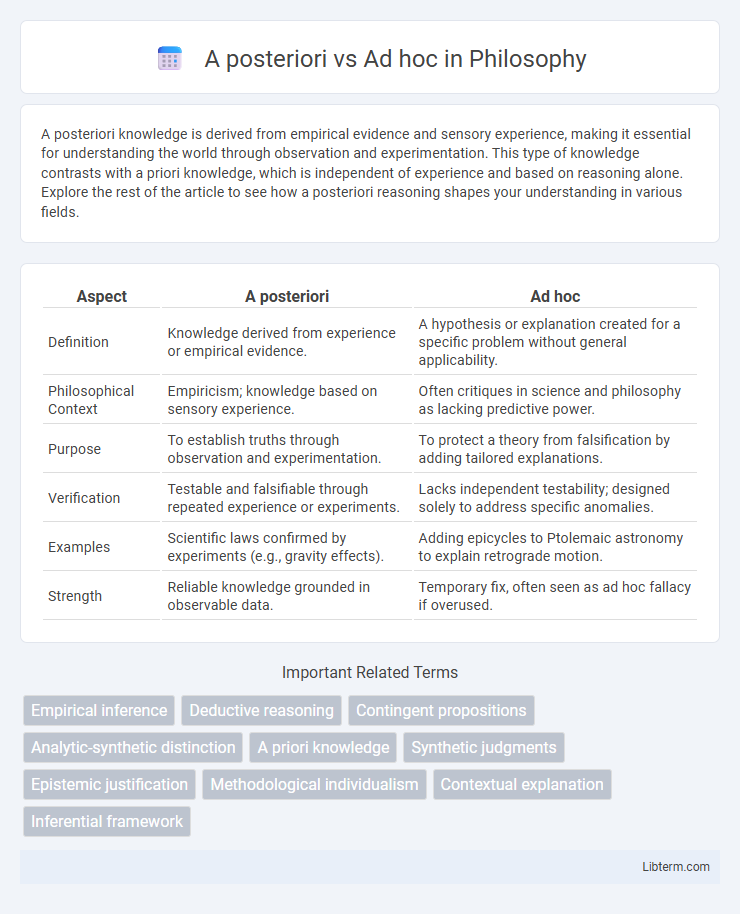A posteriori knowledge is derived from empirical evidence and sensory experience, making it essential for understanding the world through observation and experimentation. This type of knowledge contrasts with a priori knowledge, which is independent of experience and based on reasoning alone. Explore the rest of the article to see how a posteriori reasoning shapes your understanding in various fields.
Table of Comparison
| Aspect | A posteriori | Ad hoc |
|---|---|---|
| Definition | Knowledge derived from experience or empirical evidence. | A hypothesis or explanation created for a specific problem without general applicability. |
| Philosophical Context | Empiricism; knowledge based on sensory experience. | Often critiques in science and philosophy as lacking predictive power. |
| Purpose | To establish truths through observation and experimentation. | To protect a theory from falsification by adding tailored explanations. |
| Verification | Testable and falsifiable through repeated experience or experiments. | Lacks independent testability; designed solely to address specific anomalies. |
| Examples | Scientific laws confirmed by experiments (e.g., gravity effects). | Adding epicycles to Ptolemaic astronomy to explain retrograde motion. |
| Strength | Reliable knowledge grounded in observable data. | Temporary fix, often seen as ad hoc fallacy if overused. |
Understanding A Posteriori: Definition and Meaning
A posteriori knowledge is derived from empirical evidence and sensory experience, emphasizing observation and experimentation in acquiring understanding. Unlike a priori knowledge, it depends on specific data and facts obtained after investigation or interaction with the world. This empirical approach underpins scientific methods, making a posteriori reasoning fundamental in fields like physics, biology, and social sciences.
What Does Ad Hoc Really Mean?
Ad hoc refers to a solution or approach designed specifically for a particular problem or situation without considering broader applicability. It often implies a temporary, improvised, or case-specific method created to address immediate needs rather than general principles. Understanding ad hoc in this context highlights its use as a targeted, context-dependent strategy rather than a systematic or a priori framework.
Key Differences Between A Posteriori and Ad Hoc
A posteriori knowledge is derived from empirical evidence and experience, making it contingent upon sensory data, whereas ad hoc refers to solutions or explanations created specifically to address a particular problem without general applicability. A posteriori reasoning relies on observation and experimentation to form general principles, while ad hoc approaches often lack theoretical justification beyond the immediate issue. The key difference lies in the methodological basis: a posteriori knowledge is systematic and evidence-based, whereas ad hoc measures are often temporary fixes designed to resolve specific anomalies.
Historical Origins and Philosophical Background
A posteriori knowledge, rooted in empirical observation, traces back to Aristotle's philosophy emphasizing experience as the basis of understanding, contrasting with a priori knowledge derived from reason alone. Ad hoc explanations emerged in the scientific and philosophical discourse to address specific problems without broader theoretical justification, often criticized for lacking predictive power and generalizability. The historical origins of a posteriori cognition highlight the evolution of empirical methods in epistemology, while the ad hoc approach reflects a pragmatic but sometimes contentious strategy in theory development.
Common Applications in Everyday Reasoning
A posteriori knowledge is commonly applied in empirical sciences, relying on sensory experience and observation for hypothesis testing and evidence-based conclusions. Ad hoc reasoning frequently appears in everyday debates and problem-solving, where explanations or solutions are created spontaneously to address specific issues without prior theoretical support. Understanding the distinction enhances critical thinking by distinguishing between evidence-derived knowledge and context-specific, provisional adjustments.
A Posteriori in Scientific Methodology
A posteriori knowledge in scientific methodology refers to information derived from empirical evidence and observation, forming the basis for hypothesis testing and theory validation. It emphasizes data collected through experiments and real-world observations, ensuring conclusions are grounded in measurable phenomena. This approach contrasts with ad hoc explanations, which are often devised without empirical support to address specific anomalies.
Ad Hoc Solutions in Problem-Solving
Ad hoc solutions in problem-solving are specifically designed to address immediate issues without considering broader applicability or long-term consequences. These solutions are often tailored for unique cases, resulting in quick fixes that may lack scalability or generalizability in other contexts. While effective for resolving urgent or isolated problems, ad hoc approaches can lead to inconsistent results and heightened maintenance efforts over time.
Advantages and Limitations of A Posteriori Reasoning
A posteriori reasoning relies on empirical evidence and observation, enabling more reliable and verifiable conclusions grounded in real-world data. This method excels in scientific and practical contexts where hypotheses must be tested through experimentation, but it can be limited by the availability and accuracy of sensory data or measurement tools. Despite its strengths, a posteriori reasoning may struggle with abstract concepts or situations lacking empirical support, where it cannot provide definitive answers.
Criticisms Surrounding Ad Hoc Approaches
Ad hoc approaches often face criticism for lacking theoretical robustness and generalizability, relying instead on context-specific adjustments that hinder empirical validation. These methods can lead to overfitting in data analysis, making findings less reliable and difficult to reproduce across different studies or applications. In contrast, a posteriori methods build on observed data to develop theories systematically, enhancing scientific rigor and interpretability.
Choosing Between A Posteriori and Ad Hoc in Practice
Choosing between a posteriori and ad hoc approaches depends on the context and goals of the analysis. A posteriori methods rely on empirical data to form hypotheses or models, offering adaptability and evidence-based validation, while ad hoc strategies address specific problems with tailored, sometimes less generalizable solutions. In practice, favor a posteriori when data availability and objective analysis are priorities, and opt for ad hoc when immediate, context-specific problem-solving is needed without extensive datasets.
A posteriori Infographic

 libterm.com
libterm.com